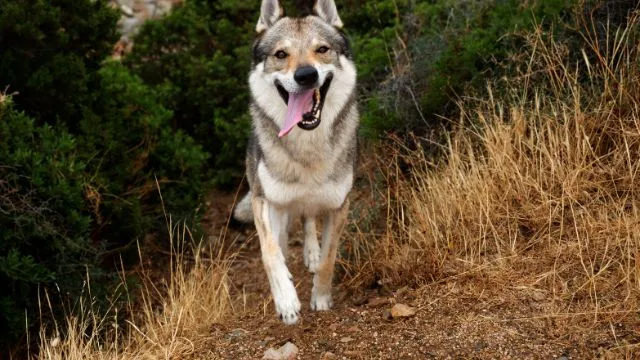Wolf hybrids, or wolf dogs, are intriguing animals created when wolves and domesticated dogs breed. They’ve been trending upward in the recent past, but not everyone can benefit from them. Everything you want to know regarding wolf dogs, from their appearance, price to their habits and care, is covered in this article.
When a domestic dog is bred with a wild wolf, the resulting hybrid is called a wolf dog. The unique appearance and characteristics of these animals are frequently used in selective breeding programs. This dog is an uncommon breed in India, making it an expensive pet.

Wolf Dog Price in India
In India, you can find many different hybrid wolf-dog breeds. In India, the cost of a wolf-dog hybrid might start at Rs.35,000 and go up to Rs.1,50,000. This dog’s price ranges widely based on a number of variables, including age, breed, and availability.
Appearance
The breed plus the amount of wolf DNA in a wolfhound determine its unique appearance. Their fur is thick, they are stocky, and their ears are pointy to see with.
Larger than most house pets, wolf dogs can reach a shoulder height of 24 to 33 inches. Males are typically larger than females, but their weight range is 50–120 pounds.
The fur of wolf canines is one of its most defining characteristics. Colors range from black to white, with shades of grey, brown, & brownish-red between them on their thick, double coat. Their back & sides have longer, coarser fur than the rest of their bodies.
The snouts of wolf dogs are typically thinner and the foreheads are wider than those of typical house pets. Their eyes are shaped like almonds and might be amber or brown, and their ears are frequently perked up.
Behavior
Wolf dogs can have a wide range of personalities due to their complex genetic make-up and upbringing. But there are some similar patterns of behavior that people often assume wolf dogs to exhibit.
They tend to be less devoted to their owners and have more of their own mind. They might not be as submissive to human authority as other domestic dog breeds.
When compared to some domestic dog breeds, wolf dogs may be more reserved and wary of strangers. They are more likely to be reticent and slow to open out to new people
These dogs, especially those with a lot of wolf in their ancestry, can be more likely to exhibit territorial behavior. They could be more inclined to spray paint their lawns or protect their snacks.
These dogs, like others, benefit greatly from early and persistent socialization, especially when they are young. Wolf dogs, if not properly socialized, can develop a fear of and even aggression toward humans and other animals.
Characteristics
- Wolf dogs, like any other breed, need early and consistent training and socialization to prevent them from developing aggressive tendencies.
- They have a reputation for being possessive and hostile toward whatever they don’t know.
- They are high-energy pets that benefit greatly from regular physical and mental challenges.
- Without adequate exercise, they might become destructive, despite their enjoyment of activities as swimming, hiking, & playing fetch.
- Having this dog as a pet is frowned upon or even forbidden in some of the countries. This is due to the fact that they pose an unpredictable and serious threat to human and animal life.
Monthly cost
Although the upfront cost to get a wolf dog may appear high, there are additional recurring expenses to think about. Things like feeding, veterinary care, education, and shelter fall under this category. Due to their specific wants and needs, wolf dogs are bit more expensive to maintain than a more typical domestic dog.
Depending on the wolf dog’s size, nutrition, and health care requirements, the monthly expense of maintaining the animal might range widely. Feeding, entertaining, and otherwise outfitting a wolf dog can cost anywhere from Rs. 8,000 to Rs. 40,000 per month. They require more extensive veterinary care than other types of canines, so owners should plan appropriately.
Food
There are many different kinds of food you may give your wolf dog. There are benefits and drawbacks to eating every single food category. You can serve them any of the following or can prepare a meal chart:
- Raw food
- Quality Kibble
- Homemade meals
- Wet food
- Freeze dried food
Health problems & issues
Like other canine breeds, wolves are susceptible to a variety of illnesses. Wolf dogs are susceptible to a number of different health problems.
Wolf canines are not immune to this hereditary disorder that affects several huge breeds of canine. In hip dysplasia, the hip joint is abnormal, which results in arthritis and pain.
Other health issues include hypothyroidism, progressive retinal atrophy, bloat, dental disease, heartworm disease, canine distemper, etc. Timely vet visits can help you control these health problems and issues easily.
Conclusion
Remember that caring for a wolf dog will demand significant time and effort on a daily basis. A wolf dog has a lifespan of 10-13 years, and giving them utmost care and love might increase their lifespan.
Santosh Kumar is a Professional SEO and Blogger, With the help of this blog he is trying to share top 10 lists, facts, entertainment news from India and all around the world.
